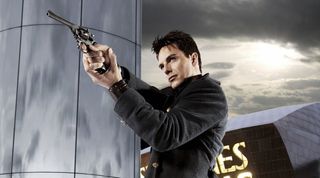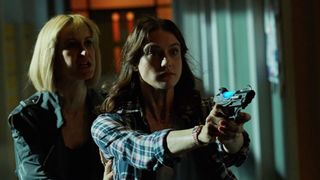Class is the Doctor Who spin-off Torchwood wishes it had been

The Doctor can travel through all of space and time, and - according to River Song - cause entire alien armies to turn and flee at the mere mention of his name, but there are still a few things beyond him. Namely, swearing and having sex. Class is the latest spin-off designed to clear those particular hurdles and with it premiering in the US last month, here's why you should watch it.
In Class, the students of Coal Hill Academy can curse and copulate on camera at will, all while taking on aliens of a far darker nature. It’s undeniably reminiscent of the promise the now decade old Torchwood made when it first burst onto the scene, but there’s one major advantage Class has over Captain Jack and his band of reprobates: it’s really, really good.
So good, in fact, that even after only two thirds of its very first season, it’s possible to see the show’s potential bubbling over the sides like an over boiled pot of pasta. Class is the show Torchwood both could and should have been, largely because its status as a Doctor Who spin-off is a very loose one. While Torchwood came to life as a season arc in David Tennant’s first run, Class is linked to Who only by geography, taking place within the corridors of Coal Hill Academy - the school featured in the very first episode of Doctor Who way back in 1963.
As such, rather than tapping into the adventures of the twelfth Doctor, Class has its own story to tell. The series focuses on an alien prince disguised as a human, his ‘slave’ - an undercover teacher bound to protect him from death at all costs - his Polish boyfriend, and three other Coal Hill students. All of them encounter aliens out for their blood each week, to the point where one of them ends up sharing her heart with the Shadow Kin, the lord of the underworld. If that all sounds a little bit involved for a first introduction, then rest easy. In practice, Class is far more straightforward.
Coal Hill plays host to a rip in space and time - a chasm that, week after week, lets in different aliens the Class team have to dispose of. To date, stories have featured a creature that attempts to feast on souls by taking the form of departed love ones, a dragon that manifests itself as a tattoo on a P.E teacher’s arm, and flower petals that pierce your skin like razors. Intermingled with all this is a bit of sex and a bit of swearing, which - on the surface at least - appears to be the exact same ingredients that went into Torchwood. The resulting dish, however, is quite different.
Torchwood’s problem wasn’t the premise of giving sci-fi an adult spin, but rather the way in which it chose to do it. When Captain Jack turned up in Doctor Who in 2005, he was a happy-go-lucky con man. He had brash, spiked up hair and an unashamedly cheesy attitude that instantly made him popular with Who’s younger audience. In Torchwood, however, Jack was saddled by an inability to die (a trait ironically handed to him by a Doctor Who plot line) and a life of loss. Like the Doctor, he’d spent centuries watching friends and partners wither and die while he went on, ageless.

The two takes on the same character were linked by little more than name and the actor playing him; Captain Jack was transformed into a man of mystery because showrunner Russell T. Davies deemed Torchwood needed a Doctor-like figure to hold it together. As a result, Torchwood’s Jack was unpredictable, troubled and, at times, positively inhuman.
Sign up to the SFX Newsletter
Get sneak previews, exclusive competitions and details of special events each month!
The big problem was, getting on board with the idea of Captain Jack being a deep and dark figure when, just a year before, he’d been as intentionally plastic as an Action Man was no easy task. While Doctor Who’s Jack flirted with anything that moved and was a charming alternative to Christopher Eccleston’s intentionally stern and stark portrayal of the Ninth Doctor, in Torchwood Jack lost his magic and, instead, mimicked the Time Lord’s hard nose approach. It didn’t fit, it didn’t make sense, and it wasn’t a convincing transition.
Echoes of the cartoon figure Jack had been in Doctor Who managed to find their way into Torchwood - his WW2 trench coat a constant visual cue - but they only served to undermine his new uncompromising and cold hearted nature, giving Torchwood an unwarranted feel of a CBBC drama throughout its run.

Ironic, then, that a show actively set in a school should turn out to be a far more adult setting for a Doctor Who spin-off. Five episodes in, Class feels more stable, more contemporary than its predecessor. Where Torchwood had an underground base that had all the subtlety of a Bond villain’s lair, Class brings the alien to the ordinary; a bedroom, a classroom, a suburban street.
Where Torchwood pitched itself as a secret organisation with power beyond the police, the Government, and the CIA, Class depicts a rag tag group of college kids who stumble through each encounter under the reluctant guidance of Miss Quill - their alien protector, serving undercover as a physics teacher and played brilliantly by former Coronation Street favourite Katherine Kelly.
Indeed, it’s Quill who best represents the difference between the two shows. Forced to stand with the rest of the team not out of choice but as a form of punishment for an attempted genocide, Quill is no ‘Doctor’ figure. Kelly plays her as a caged beast, tempered by an alien creature inserted into her brain to keep her on their side. Her knowledge of the aliens slipping into Coal Hill is limited, and her motives often unknown. It’s the blind leading the blind, and there’s no Doctor here to pop up and save the day.

It all means that, in terms of scope, the stories in Class aren’t as expansive as they were in Captain Jack’s world. Torchwood always felt like trying to build a no-holds-barred, super scary rollercoaster right in the middle of a toddler’s creche - it was an awkward fit that relied on the viewer making a number of allowances in order to get the most out of it. In comparison, Class is a more digestible tale where it’s not the world that’s under threat every waking moment, but rather the lives of its protagonists.
It’s an intentionally smaller story, and a far better drama as a result. Whether or not it manages to last the five seasons Torchwood pulled off is up for debate, but even if these first eight episodes also end up being its last, Class deserves credit for managing to break free of Doctor Who’s tropes in a way Torchwood never quite managed.
Indeed, if the prime goal of a spin-off is to capture the spirit of its source show whilst simultaneously standing on its own too feet, Class has already ensured Torchwood has been well and truly schooled.
Most Popular




